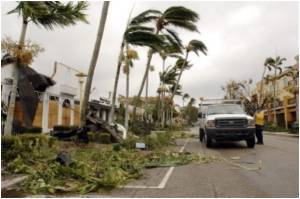Devastating tropical storms like Superstorm Sandy, which battered the US last week, could be weakened and rendered less lethal by using a simple and cheap technology based on a surprising

Wave action on the ocean surface would force warm surface water down into the deeper ocean.
According to him, if non-return valves were used the result would be to mix the waters and cool the surface temperature of the ocean to under 26.5C - the critical temperature at which hurricanes form.
Salter, who has written to the government's chief scientific officer setting out his scheme, said that harnessing energy from the waves to cool the surface temperature of the ocean makes ecological sense.
The naturally working pumps would be located in "hurricane alley" - the warm corridor in the Atlantic through which the most damaging storms typically develop and pass.
Salter claims that the hydrological problems have been solved but that research funding is urgently needed.
Advertisement
The idea of what is now known as the "Salter Sink" was first presented to the US government in 2007 at a post-Katrina US Homeland Security meeting on hurricane suppression.
Advertisement
"The Salter Sink concept is delightfully simple and singularly gargantuan," the company said in a statement posted on its website.
"It has captured our imagination here in the lab. We have done some experiments and computational modelling work to validate this idea, but a lot more research needs to be done by experts in related fields such as climate science and oceanography, and we need partners to pursue the project further," it added.
Source-ANI









